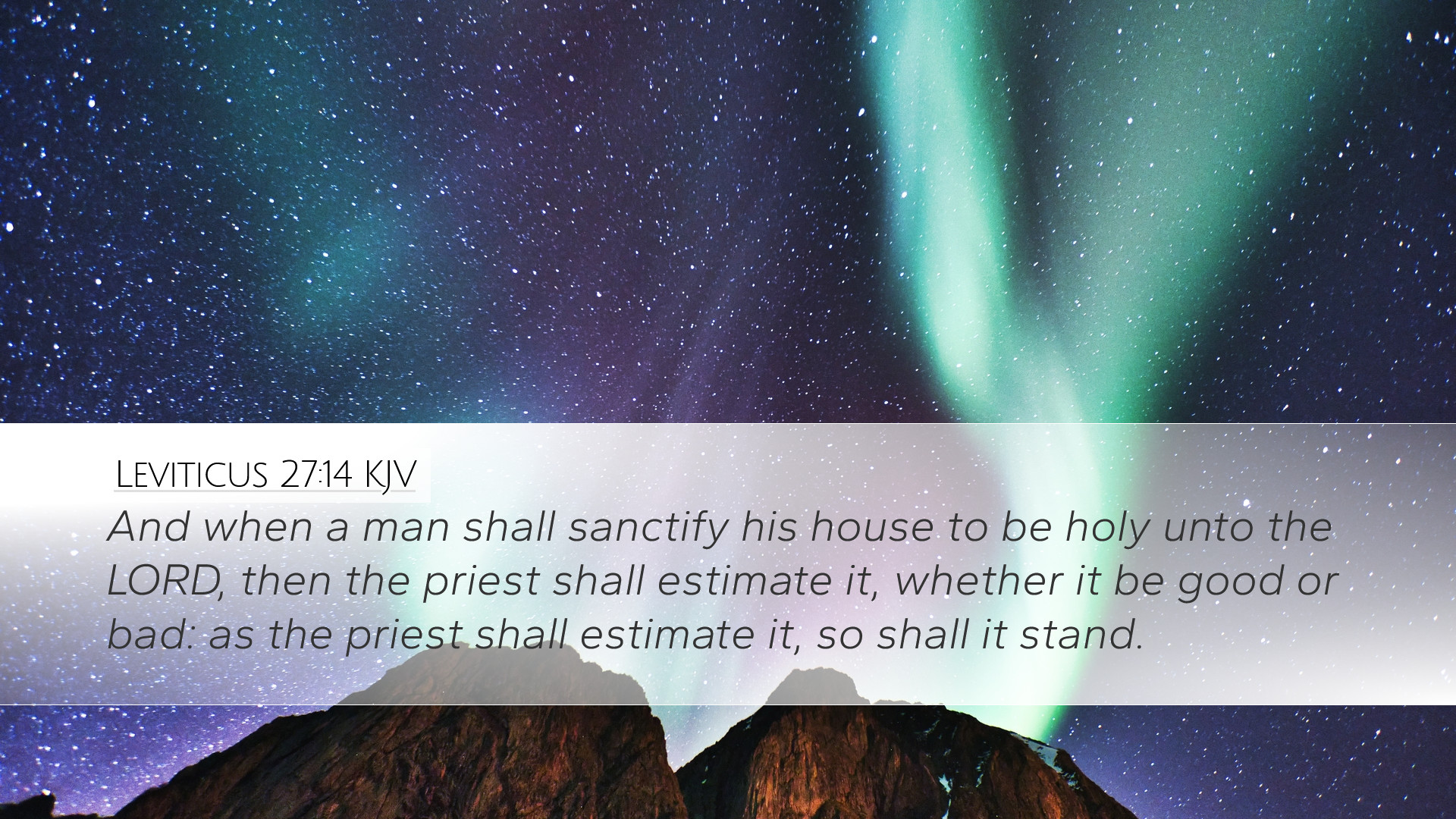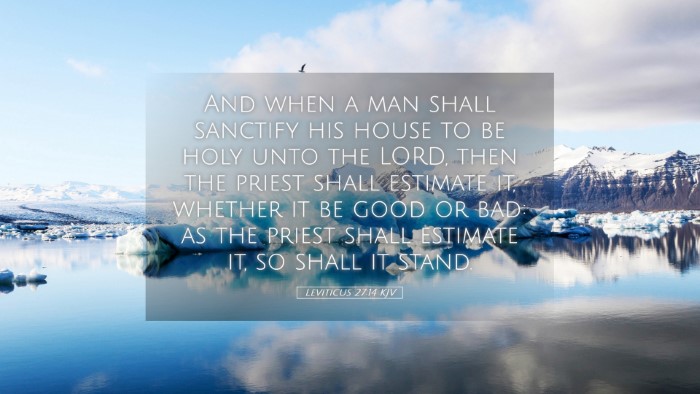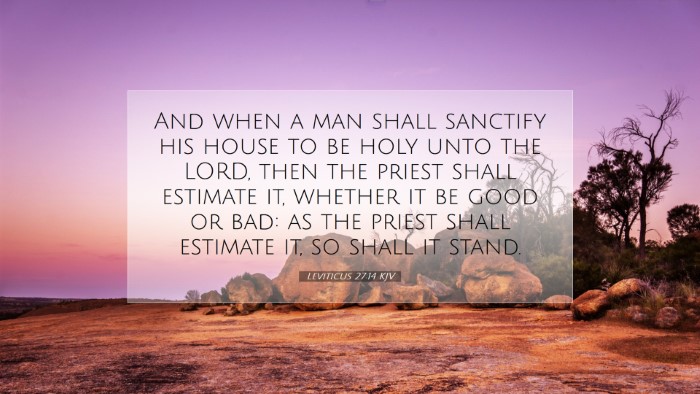Commentary on Leviticus 27:14
Verse Context: Leviticus 27:14 reads: "If a man dedicates his house to be holy to the Lord, then the priest shall value it, whether good or bad, as the priest values it, so it shall stand." This verse is part of a broader section in Leviticus concerning vows and dedications made by the Israelites, emphasizing the importance of valuation in spiritual and material matters.
Overview of Public Domain Commentaries
This analysis draws from the insights of notable commentators, including Matthew Henry, Albert Barnes, and Adam Clarke. Each offers unique perspectives that enrich our understanding of the spiritual, social, and practical implications of this verse.
Matthew Henry's Commentary
Matthew Henry emphasizes the dedication of property to the Lord as an act of faith and submission. He notes that dedicating a house signifies the owner's intent to consecrate their living space to God's glory. This act reflects a commitment to holiness that extends beyond personal devotion to affect the community within the Israelite society.
- The Role of the Priest: Henry highlights the importance of the priest's role in valuing the house. The priest acts as a mediator who assesses the worthiness of the dedication, reflecting the principles of divine valuation and stewardship. The priest’s judgment is seen as a means of ensuring that the dedication is both sincere and proper.
- The Value Assessment: He notes that the valuation process serves as a reminder that God is intimately involved in the material world. Thus, a house dedicated to God is not only a spiritual act but also engages God in the aspects of everyday life.
Albert Barnes's Commentary
Albert Barnes focuses on the implications of valuating property as sacred and includes a discussion on the economic aspects of such dedications. He suggests that the act of dedicating a house cannot be taken lightly—it requires a thoughtful understanding of its value and a firm commitment from the dedicant.
- Economic Impact of Dedication: Barnes points out that such dedications could have significant economic repercussions for families. The valuation serves to establish a financial impact not just for the individual but also for the community, as the priest's valuation might affect local practices and customs.
- Spiritual Responsibility: He highlights that with the act of dedicating comes a sense of responsibility. The individual must not only commit their property but also embody a life that reflects the holiness intended for that space.
Adam Clarke's Commentary
Adam Clarke adds depth by discussing the cultural context of the Israelite practices surrounding property and dedication. He provides insights into how the act of consecration was understood within Israel’s covenant relationship with God.
- Covenant Implications: Clarke emphasizes that dedicating a house is tied to the covenant community's identity. He sees this as a public declaration of faith, impacting not only personal piety but also the social fabric of the community.
- Principles of Valuation: Clarke explains that the priest's valuation is crucial to ensuring that every dedication maintains the integrity of worship. It represents an avenue through which individuals ensure they are rightly aligned with God's expectations in both spiritual and practical terms.
Interdisciplinary Insights
Combining the insights of these commentators illustrates that Leviticus 27:14 serves multifaceted roles within the scriptural narrative. The economic, spiritual, and social dimensions of house dedication reveal profound truths about the nature of worship and commitment to God.
Spiritual and Practical Unity
The intersection of material and spiritual realms signifies that God desires our whole lives—including our possessions—to be offered to Him. The process laid out in Leviticus ensures that such offerings are approached with careful consideration and integrity.
The Priesthood's Role
The priestly function in this context emphasizes the importance of mediators in our relationship with God. Understanding the values assigned by the priest can lead modern readers to reflect on how contemporary leaders assess our commitment to God’s work and the resources we dedicate to it.
Community Impact
Ultimately, the act of dedicating a house represents a broader commitment to community living under God's law. The implications extend beyond personal piety, underscoring collective identity within the covenant community.
Application for Today
For pastors, students, and theologians, Leviticus 27:14 is a powerful reminder that God desires our entire lives—including our homes—to reflect His holiness. In our contemporary context, this may challenge us to consider how we dedicate our resources, time, and talents for the Lord's work.
- Personal Reflection: Individuals should not only evaluate their spiritual lives but also consider how their material possessions glorify God.
- Church Leadership: Pastors might reflect on how the practices of dedication and valuation can influence congregational life and promote a culture of worship that permeates all aspects of life.
Conclusion
The commentary on Leviticus 27:14 calls believers to a holistic dedication of their lives to God. The insights from historical theologians serve to ground this understanding in both ancient practice and contemporary application, highlighting the timeless relevance of scripture as a guide for living a life set apart for God.


